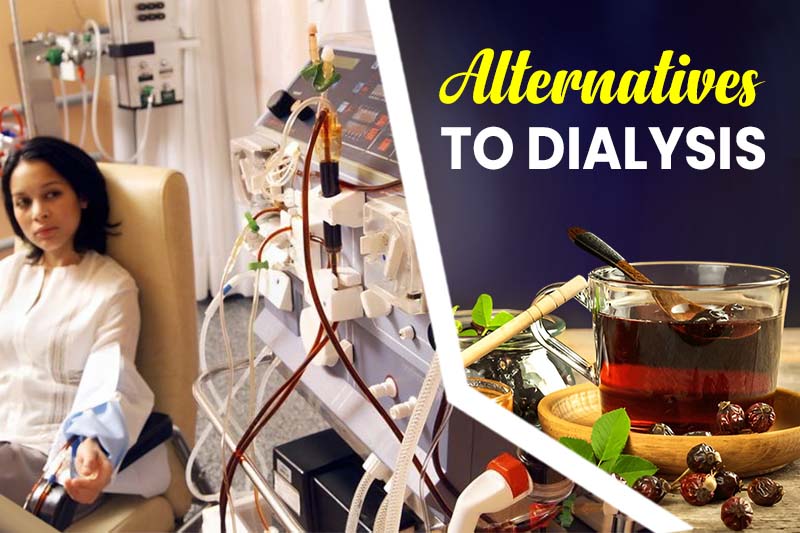
 September 03, 2025
September 03, 2025
When most people hear the word dialysis, the first thought that comes to mind is a big machine, long hours in a hospital chair, and a routine that feels more like a full-time job than a treatment. Nobody’s idea of fun, right? It’s not like you can put “dialysis sessions” under the hobbies section of your bio.
But here’s the good news: while dialysis can be life-saving and necessary in certain cases, it’s not the only path people with kidney problems have to walk. There are alternatives; some medical, some natural, and some lifestyle-focused, that may help delay or even reduce the need for dialysis.
So, grab a cup of herbal tea and explore the world of alternatives to dialysis in detail.
Think of your kidneys as nature’s personal water filters. They clean your blood, remove waste, and keep your body’s fluids balanced. When they stop working properly, waste starts piling up, like your laundry after a Netflix binge weekend. Dialysis is basically an external washing machine for your blood.
Necessary? Yes. Fun? Not so much. Which is why alternatives are worth exploring.
People often turn to dialysis alternatives, as they search for options that can help improve their renal health without having to be tied to a machine. Some viable alternatives to dialysis can be:
If dialysis is the music backdrop, then a kidney transplant is like hiring Beyoncé to perform. It's the best alternative because instead of doing the work of cleaning your blood by machine, you get a real kidney to do it naturally!
Of course, it’s not as simple as ordering a kidney on Amazon Prime. It involves matching, waiting lists, and surgery. But once it’s done, many patients say they feel like their life has been handed back to them, minus the beeping machines.
Unlike conventional approaches that only focus on the disease, Ayurvedic kidney treatment considers the body as a whole, with the primary goal of restoring balance. You have some great herbs, such as Punarnava, Varun, and Gokshura, that will help with kidney function, lack of swelling, and urine flow.
Combine that with yoga, meditation, and a clean diet, and it’s not just about your kidneys anymore; it’s about you as a whole. It’s like treating your body to a spa day every single day.
But let’s be real for a second: there is no Ayurveda overnight miracle; it’s a lifestyle. It’s a marathon, not a sprint.
Sometimes the simplest alternatives produce the greatest results. Just by making some adjustments to your diet and habits, you can place less strain on your kidneys and slow the development of disease.
Lifestyle changes may sound boring, but every little daily effort adds up, like compound interest.
In some cases, doctors may recommend conservative management over dialysis for patients, especially older adults or people with multiple chronic health conditions. Conservative management focuses on managing symptoms with medications, diet, and care interventions, as opposed to undergoing dialysis treatment.
In simpler terms, "it is not about the quantity of life, but the quality of life". Let's say you have the choice of taking in every bit of the beautiful sunset or the option to race to the busy highway at 100 mph.
Scientists are cooking up some seriously cool ideas in their labs, like wearable artificial kidneys, stem cell therapies, and regenerative medicine. Imagine slipping on a small device that does what dialysis machines do, but without tying you down to a chair for hours.
We’re not there yet, but the future looks brighter than a hospital fluorescent light.
Now, before you start planning a “Goodbye Dialysis Forever” party, let’s be clear: dialysis is essential for many people, especially when kidneys are no longer functioning. It’s not the villain; it’s the lifesaver.
The key takeaway is this: alternatives exist, and exploring them with your doctor may open up more comfortable, personalized options.
Dialysis doesn’t have to define your entire story. Whether through transplants, Ayurvedic treatment for kidneys, lifestyle changes, or future innovations, some paths can help you step off the machine (or at least use it less).
Think of it this way: your kidneys may be down, but you’re not out. With the right care and a touch of humor, you can still live fully, laugh often, and maybe even dance a little; just don’t call it the kidney shuffle.
Disclaimer: This blog is for general information only and is not a substitute for professional medical advice. Please consult your doctor for personal guidance.
Ayurvedic therapies, a kidney-friendly diet, yoga, herbal remedies, and lifestyle changes that support kidney function.
Usually only a few days to weeks, depending on overall health and residual kidney function.
On average, around 5–10 years, but many live longer with good care and a healthy lifestyle.

